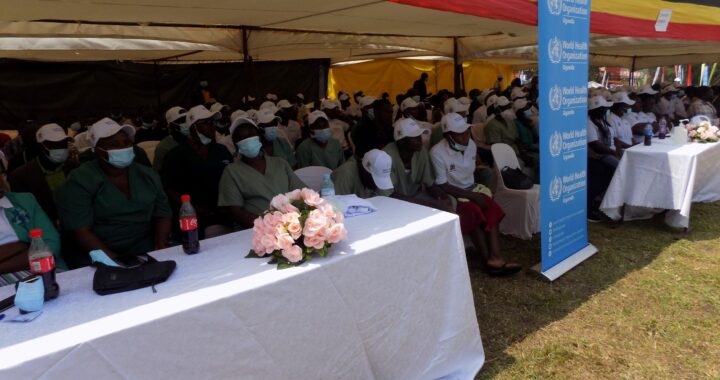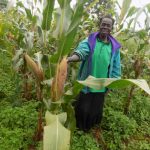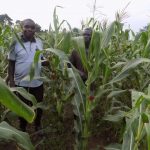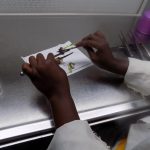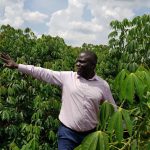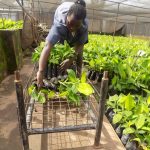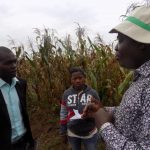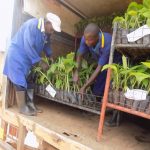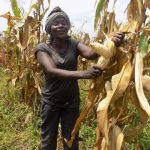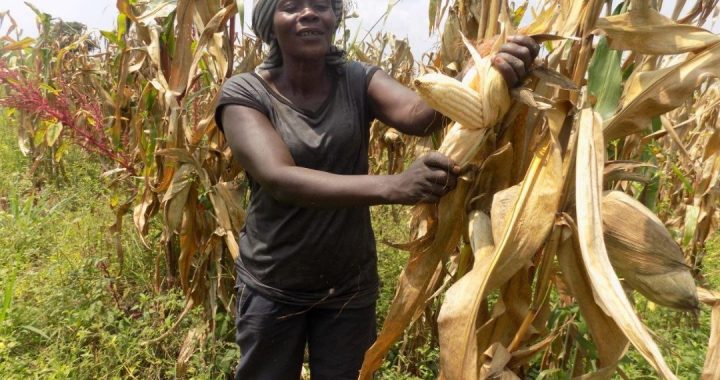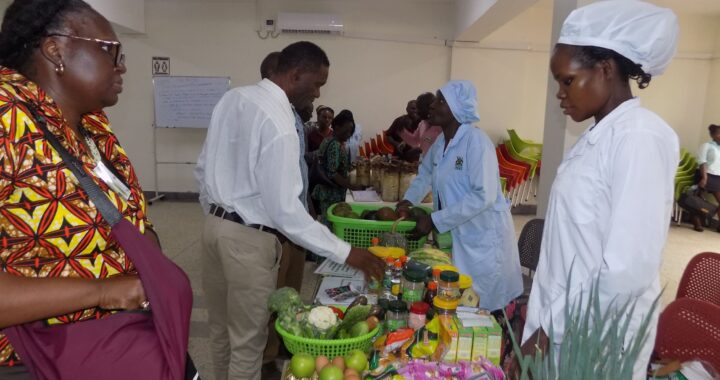Eating into your death
4 min read
Photo by Christopher Bendana A nutritionist showcase fruits during the African Traditional Medicine Exhibition at Makerere University School of Public Health Conference Hall in October
By Christopher Bendana
Kampala
Hypertension has not only brought a life of taking drugs daily for William Mubanguzi but, an eating transition as well, a routine he has to adhere to or else his blood pressure levels go high.
“I left drinking milk completely long ago,” he reveals. “I have also reduced my meat consumption. My diet consists mainly of vegetables.”
The burden of hypertension commonly referred to as pulesa and related cardiovascular diseases like stroke is on the increase according to information from the Uganda Non-Communicable Disease Alliance (UNCDA).
It is common news nowadays for a minister in her 50s, a businessman in his 40s in their prime production times dying abruptly (Kibwatukira).
The blame is on changing lifestyle due to increase in income that has tilted people to a western style lifestyle. This includes long sedentary hours in the office or workplace, travel by motor vehicle hence limited physical activity. This is compounded by consumption of processed foods with too much sugars which exposes people to develop obesity.
And now there is a likely failure for Uganda to achieve target 3:4 of the SDGs of the United Nations under Health of reducing premature mortality from NCDs by one third through prevention and treatment by 2030.
We are just encouraging people to test for blood pressure. We are in the preliminary stages. Many people are not aware of their status. I doubt we can achieve much in the remaining six years,” argues Susan Nakireka, a NCD expert at Mengo Hospital and a member at UNCDA.
She reveals that one out of four Ugandan adults has hypertension and there is no gap between those living in rural and urban areas.
“Ugandans in rural areas are consuming junk foods from the raising rural trading centers just like their urban counterparts,” she argues.
Junk food, usually fried chips and chicken, and other processed food is liked by the urban elite based on its taste and quick preparation, but nutrition experts warn of the high fat content in the food, and raw salt and their impact on blood movement in the body.

Women exercise along the Northern Bypass
The WHO considers hypertension a serious medical condition in which the blood vessels have persistently raised pressure.
Nakireka says they make a diagnosis when the blood levels reach 140/90. Any further increase above is a risk and requires medical attention,” she adds.
The good news is that things can get better if one adopts the right nutrition and physical activity.
Hypertension can increase the risk of not only heart diseases but also kidney and brain diseases, and disabilities following stroke.
Risk factors
First, Nakireka says the disease shows no symptoms in its infancy, therefore one can have it for years without knowing emphasizing the importance of continuous testing for the disease.
“Over 50 percent of people with hypertension have no symptoms,” she reveals.
Nakireka explains that people’s income has been increasing over time and more people are consuming foods with more sugars, cholesterol and fat. She argues that this affects their blood levels and the way the hearts and other key organs like the kidney function. For example, she explains that fatty foods end up in the blood vessels affecting the movement of blood and the way the heart pumps the blood.
When completely blocked it would lead to heart attack, and increased pressures in the blood vessels may result in bursting of the arteries that supply the brain tissues, leading to a stroke.
Symptoms
Nakireka says symptoms may include headache, dizziness, having nose bleeds, blindness, chest pain, and excessive body weight.
Initiatives to mitigate hypertension and other NCDs
Oyoo says the government is involved in creating awareness on responsible lifestyle on days like the National Physical Day, World Heart Day as well as on World Cancer Day. This includes which food to eat, the role of physical activity in mitigating the negative impacts of hypertension as well as the importance of continuous testing.
He reveals that all regional referral hospitals are now able to provide an integrated comprehensive NCD care in all of their programs and that they have also trained village health teams to test for hypertension and do referrals.
He highlights the establishment of the Uganda Heart Institute, the Lung Institute and Uganda Cancer Institute, and their regional programs to take care close to the communities.
He further mentions the passing of legislation on control of smoking in public
Impact
The WHO says it is a major cause of premature death globally with up to 1 in 4 men and 1 in 5 women.
The percentage of disability-adjusted life years resulting from CVD for men was 3.75% and 3.5% for women.
Way forward
Nakireka advises families to purchase blood pressure testing equipment in homes, and general frequent screening.
Oyo says they are working with the Trade ministry and Uganda Bureau of Standards to make sure food items are clearly labeled with the nutrition content so that people know what they are consuming.
He adds that the disease has gained recognition as a major health challenge attracting the attention of the health ministry and increase in funding to mitigate the spread.
David Okello, a medical doctor and public health expert at the African Centre for Global Health and Social transformation (ACHEST), a public policy health think tank in Kampala emphasizes the importance of a responsible lifestyle; including eating less salt in food and regular physical activity to control body weight.
He preaches the consumption of more vegetables and fruits, and physical activity of 150 minutes per week This may include walking, running, swimming or dancing.
“Let’s do the regular checkups, this is key in managing the disease, then those found with the diseases should go on continuous treatment,” he advises.

